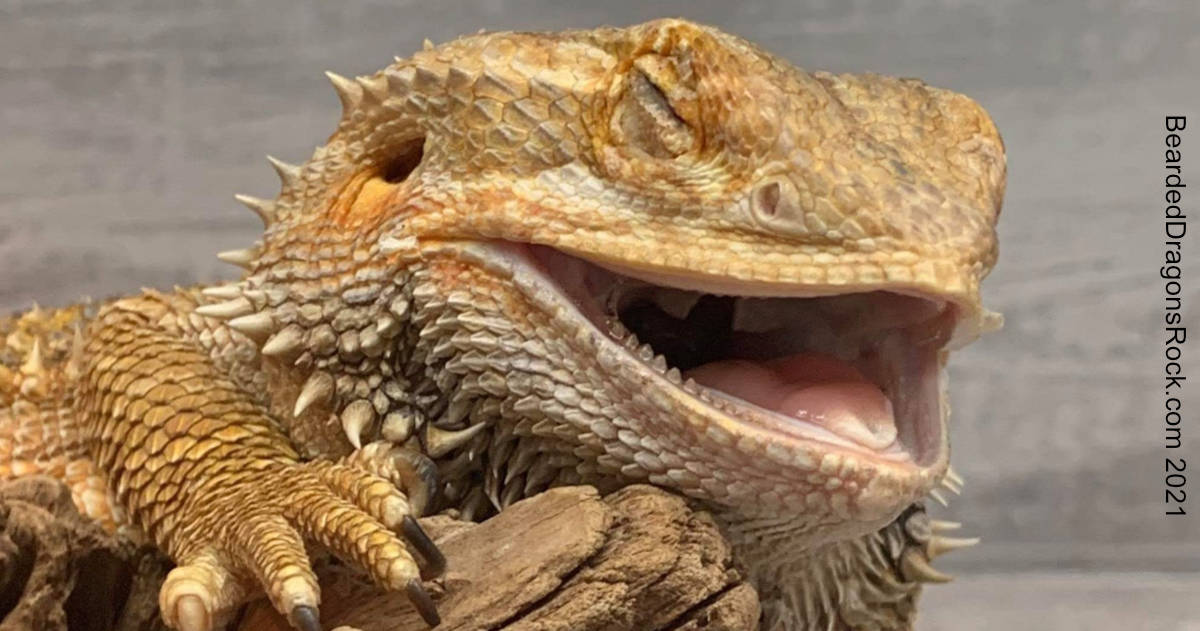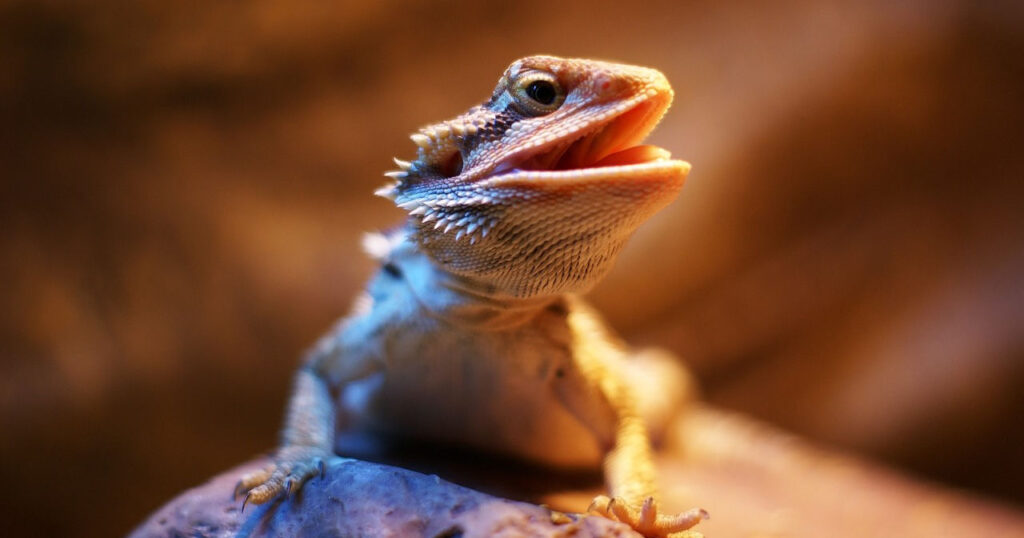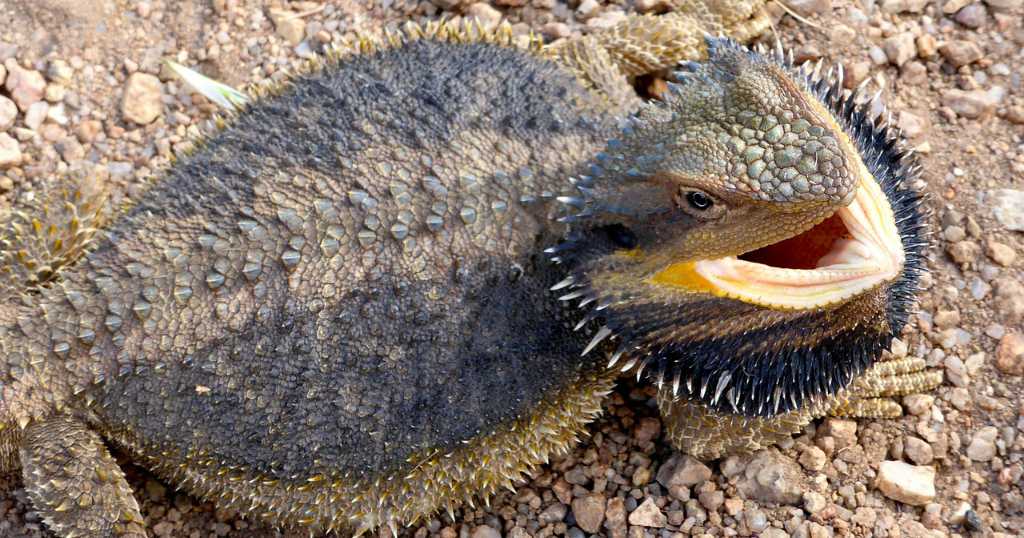Bearded Dragon Gaping
Bearded dragon gaping, or opening their mouths, is usually not a bad thing as it most often occurs to help them cool down.

Last Updated: March 14th, 2022
By: Steve
Table of Contents
Why Do Bearded Dragons Open Their Mouths
In most cases a bearded dragon gaping, or opening their mouths widely is not a cause for concern. There are various different and perfectly normal reasons for your bearded dragon to gape. If your bearded dragon is basking under their heat lamp and has their mouth open gaping it’s a good sign that they’re comfortable.
In this post we’ll look at the various different times when bearded dragons gape and try to help put your mind at ease, or let you know the next steps if the reason for the gaping needs addressing.
Gaping Can Be Good For Bearded Dragons
Gaping While Basking
There’s a few good reasons why bearded dragons will gape. Most of the time, for most people, they’ll see their bearded dragon gaping with their mouth wide open looking like they want to catch flies passively when they’re basking.
If your bearded dragon is sitting in their basking spot, underneath the heat-lamp and has their mouth wide open, they’re warm. Actually, they might even be too warm – but just like us when we get in a nice hot bath, we like to stay there. Humans sweat, bearded dragons gape. This is their way of letting some of that heat out of their body. Their tongue is big and damp and their breathing over it carries some of their excess heat away.
If they’re basking and they get too hot, they’ll generally move out of the full glare of the heat lamp and go somewhere cooler. If they’re gaping in the cool end of the vivarium it could be that the temperature is too high at that end too. We’ll go into that a bit more in the next section.

Stock Image by T Ince from Pixabay
Gaping To Stretch That Beard
Bearded dragons will sometimes gape with their mouths wide open and their beard flared. This is commonly done by our girl in the morning or sometimes after she’s eaten. They do it to stretch their beard out and presumably because it feels nice. A bit like us waking up in the morning and having a good stretch. You might also see your bearded dragon do this when they are shedding as it helps stretch the old skin which then falls away (eventually).
This will differ from the thermoregulation gape we spoke about above because it’ll often be a shorter duration and the beard will usually be stretched and relaxed alternately. Your bearded dragon may well be in the cooler area of the tank and probably moving around a bit more too, compared to the thermoregulating pose.
This sort of gaping in bearded dragons isn’t a cause for concern at all. It’s a natural way of the bearded dragon feeling good.
Gaping As A Sign Of Dominance or Aggression
Whilst this reason for your bearded dragon isn’t necessarily good it’s not overly bad either. Again, it’s nothing to be overly concerned about in terms of health – although if it happens regularly you may want to check if your bearded dragons is overly stressed about something or is feeling threatened.
In our experience it’s quite rare for bearded dragons to become aggressive but they will defend themselves if they feel threatened. This can be displayed as them having their mouth wide open, gaping, possibly with a big black beard and possibly some hissing happening too. This is one of the only times a bearded dragon will make noise.
They may do this in the presence of other bearded dragons to assert dominance, or they may do it if they feel threatened by other pets in your house or occasionally people. Bearded dragons are quite smart and usually seem to trust their human companions but often don’t trust other pets as much.
Try to remove the threatening stimulus from your bearded dragon’s environment and let them calm down if you find they’re gaping like this aggressively.

This one’s aggressive, stressed and angry – better leave them alone!
This one’s likely not a pet – it looks like an Eastern Bearded Dragon (Pogona Barbata)
Stock Image by Siggy Nowak from Pixabay
When Gaping Is Bad In Bearded Dragons
Gaping In The Cool End
If your bearded dragon is gaping in the cool end of the vivarium, in a similar fashion to how they would gape while basking (i.e, not flaring their beard, not looking aggressive) then it’s possible your temperatures are too high in the cool end. The cool end of the tank should be between 22 degrees Celsius and 30 degrees Celsius ( 72 Fahrenheit – 85 Fahrenheit ) during the day.
This is one reason why the right size of tank is absolutely vital for keeping your bearded dragon safely because if the tank is too small then the closeness of the heat lamp will cause the whole tank to become too hot and there’ll be nowhere your dragon can escape from the heat. A 75 gallon tank is the absolute minimum.
If your bearded dragon is gaping in the cool end of the tank – and they don’t look like they’re aggressive or simply stretching their beard, then they may have a respiratory infection. The next subsection deals with gaping due to a respiratory infection.
Gaping And ‘Coughing’ And/Or Lots Of Saliva Present
This form of gaping is a problem because it indicates a high probability that your bearded dragon has a respiratory infection. Without adequate treatment a respiratory infection can cause death, so it’s worth getting them checked out by a vet.
A bearded dragon that’s gaping due to a respiratory infection will look quite different to one that’s gaping due to being warm. The symptoms of a bearded dragon that’s gaping because of respiratory infection could include all or some of the following;
- Gaping in the cool end – but not being too hot, aggressive, or just stretching
- Lots of stringy saliva at the corners of their mouths
- String saliva on other areas of their lips
- Increased breathing effort over a longer period (beardies will naturally take deep breaths sometimes but usually only for two or three breaths at a time).
- Attempts to cough (they can’t actually cough as they have no diaphragm, but their rib movement may look like they’re trying to).
- Decreased breathing effort if they’re becoming significantly unwell (but by then they’ll look awful too).
- Clicking sounds while breathing.
- The usual suspects of off food, increasing lethargy etc.
If you think your bearded dragon might have a respiratory infection then have a look at our post dedicated to the topic by clicking this sentence. In that post we go into much more detail about what you can do to help and when you should see a vet.
What Should I Do When My Bearded Dragon Is Gaping?
In the vast majority of cases you don’t need to do anything at all when your bearded dragon is gaping. Except maybe grab the phone and take a picture because they can look so cute (and happy!) when they’re gaping.
But if they’re gaping because it’s too hot in the cool end of their tank then you’re going to need to work to cool it down at that end. This may involve buying a bigger tank unfortunately – if you have a 40, 55 or 65 gallon tank it’s too small.
If your bearded dragon is gaping to show aggression or to defend themselves you’ll need to look at what it is that’s making them do it and remove the stimulus if you can. This could be other pets, or visibility of birds outside for example.
And finally, if they’re gaping because they have a respiratory infection then read more about that here to find out what to do.
Why Is My Bearded Dragons Mouth Slightly Open?
This behaviour in a bearded dragon differs from gaping because in gaping the mouth is usually quite widely open. If your bearded dragon only has their mouth slightly open occasionally then it’s not really anything to worry about – they’re probably just relaxed in their environment.
But if it’s slightly open almost all the time then it can a sign of metabolic bone disease. This can be known as ‘rubber mouth’, ‘rubber jaw’, ‘slack mouth’ or various variations of that theme. This is because the bearded dragon’s mouth loses rigidity as it doesn’t have enough calcium to keep it strong.
It may be accompanied by one jaw being shorter than the other and the jaw itself becoming deformed such that the bearded dragon can no longer properly close its mouth – hence having it slightly open all the time.
For more information about metabolic bone disease in bearded dragons click this sentence. The most important thing if you suspect MBD though is to contact a vet and arrange some blood tests to rule it in or out.
